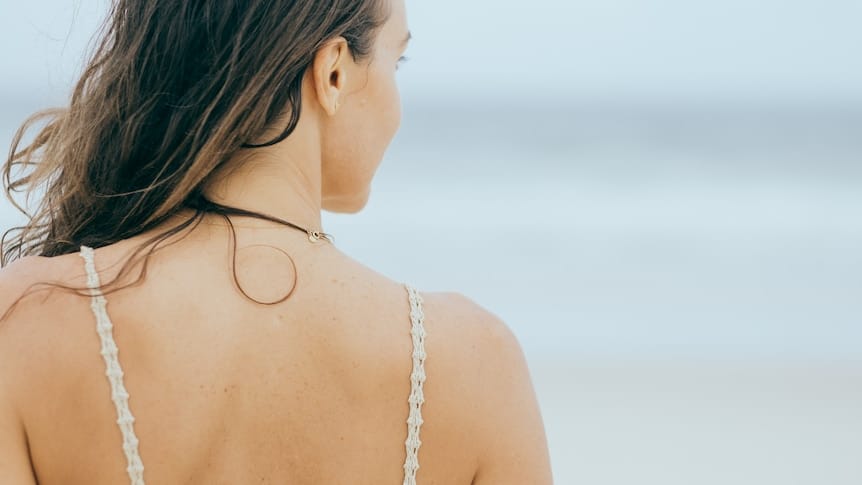
19 Jan Sun Exposure Warning
As Posted on abcnet.au/news
Dermatologists say vitamin A products are exploding in popularity but warn of potential for sun damage
By Tahlia Roy
rom recommendations, tutorials and box-opening videos, there are millions of social media clips offering beauty and health advice to a younger audience on TikTok and Instagram.
And one type of skincare product is having its moment in the sun: retinol and retinoids.
Retinoids are topical vitamin A products that act on the skin’s collagen and elastin to “regenerate and remodel”, while retinol is a type of retinoid.
According to experts, retiniods are great for the skin, but they come with one very big caveat.
So, how do retinol and retinoids differ?
Sydney Skin director and dermatologist Dr Li-Chuen Wong says retinoids act by taking away the top layer of skin to give a fresher and more dewy appearance.
This can be useful when dermatologists are treating sun-damaged skin, by removing atypical skin cells and thereby preventing malignancies or skin cancers.
“Retinol and retinaldehyde are actually derivatives and therefore weaker options. They are the broken down form of pure retinoic acid,” Dr Wong says.
She says retinol products are widely available over the counter, while retinoic acid needs to be prescribed by a doctor.
She says the derived products are gentler and more suitable for people with sensitive skin, but if used on a regular basis, are “still very effective.”
Her overarching message is that interested consumers need to get their skin used to vitamin A.
“Because it’s like a double-edged sword: it’s got wonderful properties that are good for rejuvenation, however, the side effect is that it can cause skin irritation and redness if it is used too much.”
Dr Wong says she is thrilled that many skincare products and techniques are exploding in popularity among younger people on TikTok and Instagram.
“I think it’s a really good thing,” Dr Wong exclaims.
“I think people are more aware about the importance of looking after their skin, particularly in Australia, where we have the unenviable role of having the [highest] incidence of melanoma in the world.”
She says the social media skincare frenzy is extending to her clinic as she sees more and more clients come to her to ask about retinol and retinoids.
You’re empowered when you’re educated and I really encourage my patients to Google and get as much education from whatever source and then come in and talk to me about it, so we can work out the best treatment option.”
Popularity of vitamin A products prompts sun exposure warning
But as the products increasingly become commonplace in people’s skincare routine, Dr Wong is warning about the dangers of vitamin A and sun exposure.
“Vitamin A products definitely make your skin more photosensitive.”
The use of vitamin A derivatives is known to make skin more sensitive to sunlight — a side effect many users may not be aware of.
Being mindful of the skin’s increased photosensitivity when using certain products is particularly important for Australians, who live in the skin cancer capital of the world.
More than 11,500 Australians are diagnosed with melanoma each year, according to the Cancer Council, with skin cancers accounting for more than 80 per cent of new cases of cancer diagnosed in Australia each year.
Dr Wong says while vitamin A has great benefits, the products should only ever be used at night and washed off in the morning before going outside into the sun.
“Apply it as the last thing you do at night, and then in the morning, cleanse your face and use moisturiser and sunscreen.”
The ABCs of skincare
While Dr Wong says to use vitamin A at night, she also recommends vitamins B and C, both of which can be used in the morning.
“Vitamin B, otherwise called niacinamide, is just a wonderful all-round, anti-ageing preparation,” she says.
“It’s great for helping dyspigmentation, as an antioxidant and for rejuvenation.”
She says topical vitamin C is also effective at promoting collagen and as an antioxidant.
“Vitamins B and C should be used in the morning before moisturiser and sunscreen,” she says.
And Dr Wong says while she supports the social media hype around skincare as it creates awareness, she also cautions patients to be wary of marketing.
“What’s really important is that people start to look at the labels of their products and make sure there are active cosmeceuticals of certain percentages,” she says.
“I’d counsel people to look at the label and not get sold on marketing and TikTok exposure of the newest and shiniest products.”
She says best practice skincare doesn’t have to be expensive if people stick to the ABCs and always use sunscreen.
She also encouraged people to consult their general practitioner or see a dermatologist if they have specific concerns.



